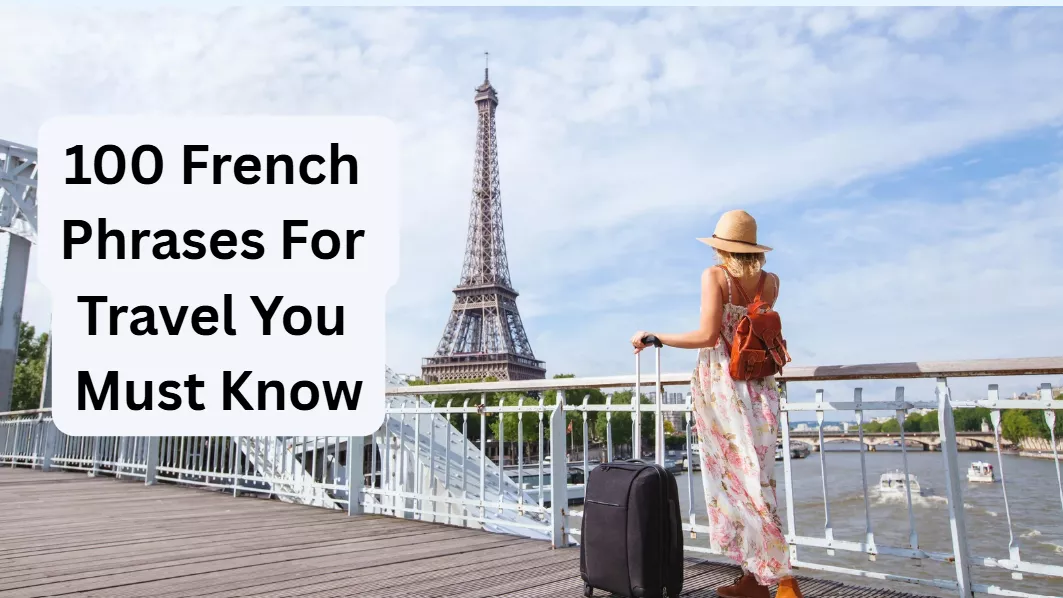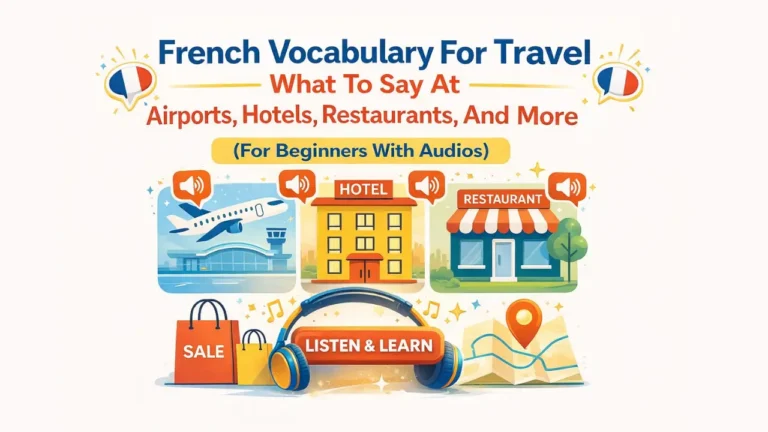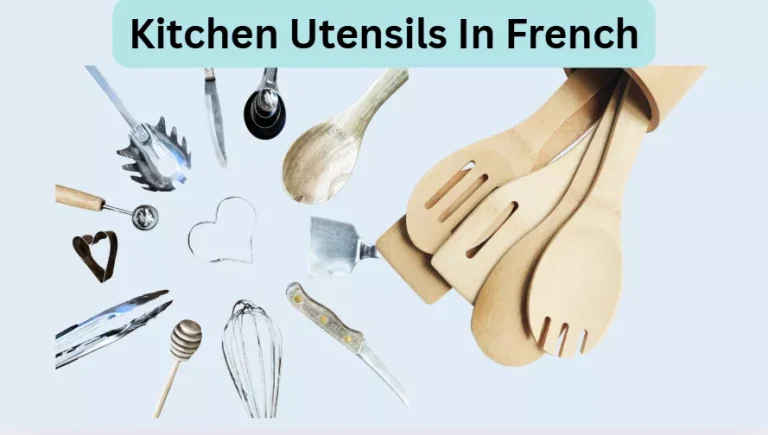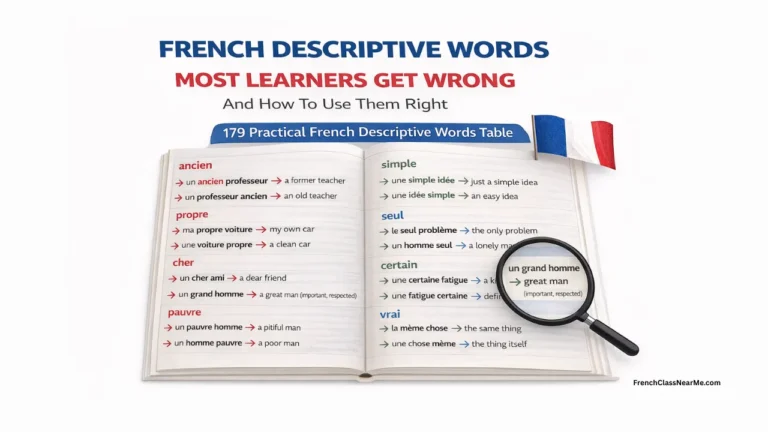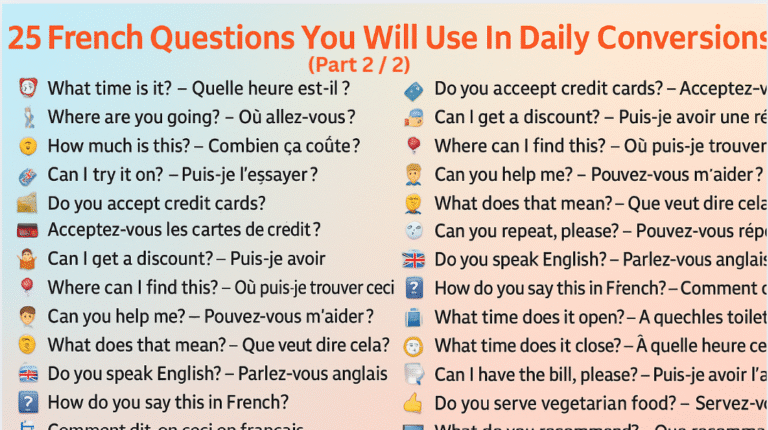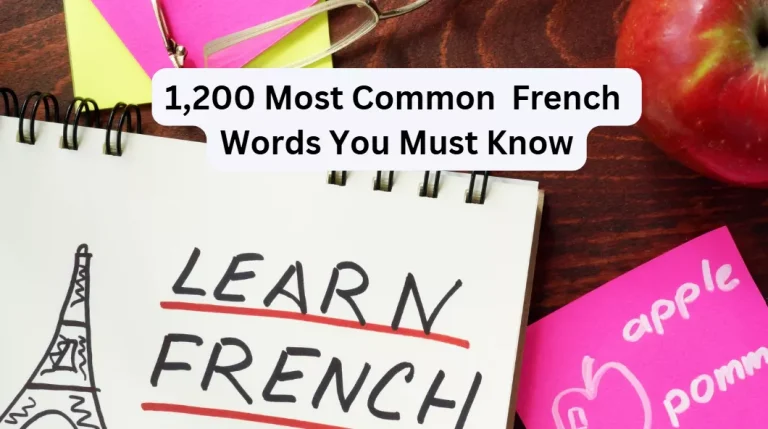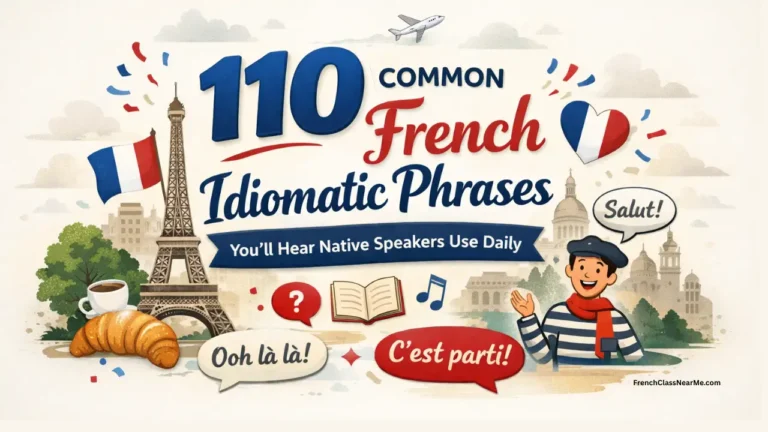100 French Phrases For Travel You Must Know
Planning a trip to France? Then mastering these essential French phrases for travel should be your top priority. Ever found yourself wishing you spoke the local language while exploring new places? This guide is packed with the 100 most useful expressions for travelers. From ordering food and asking for directions to handling emergencies, these phrases will make your journey smoother and more enjoyable. By the end, you’ll feel like a confident traveler ready for any situation.
Why Learning These French Travel Phrases Matters
Imagine landing in Paris, walking into a cozy café, and ordering in perfect French. The smile you’ll get is worth it. French isn’t just a language; it’s part of the cultural experience. Learning a few key phrases helps you connect with locals, avoid misunderstandings, and even score better service. Whether it’s transportation, food, accommodation, or emergencies, these phrases cover everything.
How To Use This Guide
We’ve divided the phrases into practical categories like greetings, transportation, dining, shopping, emergencies, and more. Each phrase includes its French version, the transliteration (so you can pronounce it), and its English meaning. Practice them before your trip or keep this guide handy for quick reference.
100 French Phrases For Travel You Must Know
Here’s the complete list of essential phrases, broken down by category and numbered for easy reference:
Greetings & Basics
| No | French Phrase (Transliteration) | English Meaning |
|---|---|---|
| 1 | Bonjour (bohn-zhoor) | Hello / Good morning |
| 2 | Bonsoir (bohn-swahr) | Good evening |
| 3 | Salut (sa-loo) | Hi |
| 4 | Comment ça va ? (koh-mohn sah vah) | How are you? |
| 5 | Ça va bien, merci (sah vah byan mehr-see) | I’m fine, thank you |
| 6 | Merci beaucoup (mehr-see boh-koo) | Thank you very much |
| 7 | De rien (duh ryahn) | You’re welcome |
| 8 | Excusez-moi (ex-kew-zay mwah) | Excuse me |
| 9 | S’il vous plaît (seel voo pleh) | Please |
| 10 | Oui (wee) | Yes |
Polite Expressions
| No | French Phrase (Transliteration) | English Meaning |
|---|---|---|
| 11 | Non (noh) | No |
| 12 | Pardon (par-dohn) | Sorry |
| 13 | Je suis désolé(e) (zhuh swee day-zo-lay) | I’m sorry |
| 14 | Parlez-vous anglais ? (par-lay voo ahn-gleh) | Do you speak English? |
| 15 | Je ne parle pas français (zhuh nuh parl pah frahn-seh) | I don’t speak French |
| 16 | Répétez, s’il vous plaît (ray-pay-tay seel voo pleh) | Repeat, please |
| 17 | Plus lentement, s’il vous plaît (ploo lon-teh-mon seel voo pleh) | Slower, please |
| 18 | Merci, c’est gentil (mehr-see seh zhahn-tee) | Thank you, that’s kind |
| 19 | D’accord (da-kor) | Okay |
| 20 | Bien sûr (byan soor) | Of course |
Transportation
| No | French Phrase (Transliteration) | English Meaning |
|---|---|---|
| 21 | Où est la gare ? (oo eh lah gar) | Where is the train station? |
| 22 | Où est l’aéroport ? (oo eh lay-ro-por) | Where is the airport? |
| 23 | Où puis-je prendre un taxi ? (oo pwee zhuh prondr un tak-see) | Where can I get a taxi? |
| 24 | Combien coûte le billet ? (kohm-byen koot luh bee-yay) | How much is the ticket? |
| 25 | À quelle heure part le train ? (ah kel uhr par luh tran) | What time does the train leave? |
| 26 | Où est la station de métro ? (oo eh lah sta-syon duh meh-tro) | Where is the metro station? |
| 27 | Je voudrais aller à… (zhuh voo-dray ah-lay ah…) | I’d like to go to… |
| 28 | C’est loin ? (seh lwahn) | Is it far? |
| 29 | À gauche (ah gohsh) | To the left |
| 30 | À droite (ah drwaht) | To the right |
Shopping in France
Shopping in France is an experience you don’t want to miss—especially in cities like Paris, Lyon, and Marseille. From luxury boutiques to charming local markets, you’ll need the right phrases to interact confidently. Whether you’re bargaining for a souvenir or asking for your size, these phrases will save you time and help you avoid awkward moments.
Here are the essential shopping phrases you should learn:
| No. | English Phrase | French Phrase (Transliteration) |
|---|---|---|
| 31 | How much does it cost? | Combien ça coûte ? (kom-bya sa koot) |
| 32 | I would like to buy this | Je voudrais acheter ça (zhuh voo-dray ash-tay sa) |
| 33 | Do you have this in another size? | L’avez-vous dans une autre taille ? (la-vay voo dahn zewn otr tay) |
| 34 | Do you accept credit cards? | Acceptez-vous les cartes de crédit ? (ak-sep-tay voo lay kart duh cray-dee) |
| 35 | Where is the fitting room? | Où est la cabine d’essayage ? (oo ay la ka-been day-say-yazh) |
| 36 | I’m just looking | Je regarde seulement (zhuh ruh-gard seul-mohn) |
| 37 | Can you wrap it as a gift? | Pouvez-vous l’emballer comme cadeau ? (poo-vay voo lahm-ba-lay kom kah-do) |
| 38 | Do you have something cheaper? | Avez-vous quelque chose de moins cher ? (ah-vay voo kel-kuh shoz duh mwan sher) |
| 39 | I’ll take it | Je le prends (zhuh luh prahn) |
| 40 | Can I get a receipt? | Puis-je avoir un reçu ? (pwee-zhuh ah-vwar uh ruh-sue) |
Dining in France
Dining out in France is a cultural experience—think croissants, escargots, and fine wines! Knowing some basic French dining phrases can make your experience much smoother, whether you’re ordering at a café or reserving a table at a Michelin-starred restaurant.
Here are the top dining phrases to keep in mind:
| No. | English Phrase | French Phrase (Transliteration) |
|---|---|---|
| 41 | I would like a table for two | Je voudrais une table pour deux (zhuh voo-dray ewn tabl poor duh) |
| 42 | Can I see the menu? | Puis-je voir le menu ? (pwee-zhuh vwar luh muh-new) |
| 43 | What do you recommend? | Que recommandez-vous ? (kuh ruh-kom-mohn-day voo) |
| 44 | I am vegetarian | Je suis végétarien (zhuh swee vay-zhay-tah-ryehn) |
| 45 | I have a food allergy | J’ai une allergie alimentaire (zhay ewn ah-ler-zhee ah-lee-mon-tair) |
| 46 | I would like water, please | Je voudrais de l’eau, s’il vous plaît (zhuh voo-dray duh lo, seel voo pleh) |
| 47 | The bill, please | L’addition, s’il vous plaît (la-dee-syon seel voo pleh) |
| 48 | Is service included? | Le service est-il compris ? (luh ser-vees ay-teel kom-pree) |
| 49 | This is delicious | C’est délicieux (say day-lee-syeuh) |
| 50 | Can I have the wine list? | Puis-je avoir la carte des vins ? (pwee-zhuh ah-vwar la kart day van) |
Emergencies in France
Emergencies happen when you least expect them. Whether it’s losing your passport, getting injured, or needing a doctor, these phrases could be lifesaving. French locals appreciate when you try their language—even in stressful situations.
Here are the top emergency phrases:
| No. | English Phrase | French Phrase (Transliteration) |
|---|---|---|
| 51 | Help! | Au secours ! (oh suh-koor) |
| 52 | Call an ambulance! | Appelez une ambulance ! (ah-pleh ewn ahm-bew-lahns) |
| 53 | I need a doctor | J’ai besoin d’un médecin (zhay buh-swan dun med-sahn) |
| 54 | I lost my passport | J’ai perdu mon passeport (zhay pair-doo mon pass-por) |
| 55 | Where is the pharmacy? | Où est la pharmacie ? (oo ay la far-mah-see) |
| 56 | I feel sick | Je me sens malade (zhuh muh sahn mah-lahd) |
| 57 | I need the police | J’ai besoin de la police (zhay buh-swan duh la poh-lees) |
| 58 | There’s been an accident | Il y a eu un accident (eel yah ew uh-nak-see-dahn) |
| 59 | Can you help me? | Pouvez-vous m’aider ? (poo-vay voo meh-day) |
| 60 | My wallet was stolen | On m’a volé mon portefeuille (on mah vo-lay mon por-tuh-fuhy) |
Sightseeing in France
From the Eiffel Tower to the French Riviera, sightseeing is a big part of traveling in France. Knowing a few key phrases will help you ask for directions, join guided tours, and fully enjoy the experience.
Here are the most useful sightseeing phrases:
| No. | English Phrase | French Phrase (Transliteration) |
|---|---|---|
| 61 | Where is the Eiffel Tower? | Où est la tour Eiffel ? (oo ay la toor ay-fel) |
| 62 | Is there a guided tour? | Y a-t-il une visite guidée ? (yah-teel ewn vee-zeet gee-day) |
| 63 | What time does it open? | À quelle heure ça ouvre ? (ah kel ur sa oovr) |
| 64 | How much is the entrance fee? | Combien coûte l’entrée ? (kom-bya koot lon-tray) |
| 65 | Can I take pictures here? | Puis-je prendre des photos ici ? (pwee-zhuh prahndr day fo-to ee-see) |
| 66 | Where is the museum? | Où est le musée ? (oo ay luh myoo-zay) |
| 67 | Is there a discount for students? | Y a-t-il une réduction pour les étudiants ? (yah-teel ewn ray-dook-syon poor lay ay-too-dyahnt) |
| 68 | How far is it from here? | C’est loin d’ici ? (say lwahn dee-see) |
| 69 | Is there an audio guide? | Y a-t-il un audioguide ? (yah-teel uh no-dee-oh-geed) |
| 70 | Where is the tourist information center? | Où est l’office de tourisme ? (oo ay lo-fees duh too-reesm) |
Miscellaneous Useful Phrases
Finally, here are some phrases that don’t fit neatly into one category but are still extremely helpful during your travels.
| No. | English Phrase | French Phrase (Transliteration) |
|---|---|---|
| 71 | I don’t understand | Je ne comprends pas (zhuh nuh kom-prah pah) |
| 72 | Do you speak English? | Parlez-vous anglais ? (par-lay voo ahn-glay) |
| 73 | Just a moment, please | Un instant, s’il vous plaît (uhn an-stahn seel voo pleh) |
| 74 | I’m lost | Je suis perdu (zhuh swee pair-doo) |
| 75 | Please write it down | Écrivez-le, s’il vous plaît (ay-kree-vay luh seel voo pleh) |
| 76 | What does this mean? | Qu’est-ce que ça veut dire ? (kes-kuh sa vuh deer) |
| 77 | Can you show me on the map? | Pouvez-vous me montrer sur la carte ? (poo-vay voo muh mon-tray sur la kart) |
| 78 | I’m learning French | J’apprends le français (zhah-prahn luh frahn-say) |
| 79 | Have a good day | Bonne journée (bun zhor-nay) |
| 80 | Good luck | Bonne chance (bun shans) |
| 81 | Can I charge my phone here? | Puis-je charger mon téléphone ici ? (pwee-zhuh shar-zhay mon tay-lay-fohn ee-see) |
| 82 | I’m here for vacation | Je suis ici en vacances (zhuh swee ee-see ahn va-kahns) |
| 83 | How do you say this in French? | Comment dit-on ça en français ? (kom-mohn dee ton sa ahn frahn-say) |
| 84 | I need internet | J’ai besoin d’internet (zhay buh-swan dan-ter-net) |
| 85 | Where is the nearest metro station? | Où est la station de métro la plus proche ? (oo ay la stah-syon duh may-tro la plew prosh) |
| 86 | Excuse me for being late | Excusez-moi d’être en retard (ex-kew-zay mwah det-rah retar) |
| 87 | I’m looking for this address | Je cherche cette adresse (zhuh shersh set ah-dress) |
| 88 | Can you call me a taxi? | Pouvez-vous m’appeler un taxi ? (poo-vay voo mah-play uh taxi) |
| 89 | What is the Wi-Fi password? | Quel est le mot de passe Wi-Fi ? (kel ay luh moh duh pass wee-fee) |
| 90 | I would like to confirm my reservation | Je voudrais confirmer ma réservation (zhuh voo-dray kon-fear-may ma ray-zair-va-syon) |
| 91 | Is there a laundry nearby? | Y a-t-il une laverie à proximité ? (yah-teel ewn lah-vree ah prox-ee-mee-tay) |
| 92 | Can I pay in cash? | Puis-je payer en espèces ? (pwee-zhuh pay-yay ahn ess-pess) |
| 93 | Is this the right platform? | Est-ce la bonne voie ? (ess la bun vwah) |
| 94 | Where can I find a taxi? | Où puis-je trouver un taxi ? (oo pwee-zhuh troo-vay uh taxi) |
| 95 | Do you have a business card? | Avez-vous une carte de visite ? (ah-vay voo ewn kart duh vee-zeet) |
| 96 | I don’t feel well | Je ne me sens pas bien (zhuh nuh muh sahn pah byan) |
| 97 | Can I cancel my booking? | Puis-je annuler ma réservation ? (pwee-zhuh ah-nyu-lay ma ray-zair-va-syon) |
| 98 | Is breakfast included? | Le petit déjeuner est-il inclus ? (luh puh-tee day-zhuh-nay ay-teel an-kloo) |
| 99 | Where can I buy a SIM card? | Où puis-je acheter une carte SIM ? (oo pwee-zhuh ash-tay ewn kart seem) |
| 100 | See you soon | À bientôt (ah byan-to) |
Detailed Explanations & Usage Tips
Now that you have the phrases, let’s go deeper. Simply memorizing words isn’t enough—you need to know how and when to use them. Below, we’ll break down these phrases by context with practical tips.
1. Greetings & Basic Manners
Greetings are your first impression. In France, politeness matters a lot. Always say “Bonjour” when entering a shop or restaurant. Avoid skipping it, as it can come off as rude.
Pro Tip: Use “Bonsoir” after 6 PM.
2. Asking for Help
When you’re lost, “Excusez-moi” followed by your question will go a long way. French people appreciate when you at least start in French, even if you switch to English later.
Scenario Example:
You’re in Lyon trying to find a museum. Say:
Excusez-moi, où est le musée des Beaux-Arts ? (Excuse me, where is the Fine Arts Museum?)
3. Navigating Transportation
Public transport can be overwhelming if you don’t know the lingo. Words like gare (station) and billet (ticket) will help you avoid confusion.
Tip: If you’re asking for directions, add “S’il vous plaît” to sound polite.
4. Dining Like A Local
Ordering food in French restaurants is an experience. Use “Je voudrais…” (I would like) instead of “Je veux” (I want), which sounds too direct.
Example:
Je voudrais un croissant et un café, s’il vous plaît.
(I would like a croissant and a coffee, please.)
5. Shopping Essentials
Knowing how to ask for prices and sizes is crucial.
Example:
Combien ça coûte ? (How much does it cost?)
Avez-vous une taille plus grande ? (Do you have a bigger size?)
6. Emergencies
Hopefully, you won’t need these, but if you do, they’re lifesavers.
Example:
Appelez une ambulance ! (Call an ambulance!)
J’ai besoin d’un médecin. (I need a doctor.)
Extra Travel Tips
- Always carry cash: Small shops or cafés might not accept cards.
- Use polite phrases: Even a simple “Merci” makes interactions smoother.
- Learn numbers: Prices, addresses, and times often require basic counting.
- Pronunciation matters: Even if your grammar isn’t perfect, sounding close to correct helps.
Conclusion
Traveling to a French-speaking country can be an unforgettable experience, but it’s even better when you can communicate confidently. These essential French phrases for travel give you the power to navigate new places, order your favorite dishes, ask for directions, and even handle emergencies with ease. Whether you’re exploring the charming streets of Paris, savoring a croissant at a café, or shopping for souvenirs, the right words can transform your trip from stressful to seamless.
The best part? You don’t have to be fluent to make a big impact. Locals appreciate it when travelers make an effort, even if it’s just a few words. So, practice these phrases before your trip, jot them down on your phone, or keep a small phrasebook handy.
Remember, language is not just about words—it’s about connecting with people and cultures. When you speak even a little French, you show respect and openness, and that often leads to friendlier interactions and unforgettable experiences.
So, as you pack your bags, pack these phrases too. They’ll help you feel confident, prepared, and ready for any adventure. Bon voyage!
FAQs
1. Do I need to speak fluent French to travel in France?
No, knowing a few key phrases is enough for basic communication, and locals appreciate the effort.
2. How do I practice these phrases before traveling?
You can use language apps, flashcards, or repeat them out loud daily to get comfortable.
3. Are these phrases useful in all French-speaking countries?
Yes, they work in most regions, but accents and slang might vary slightly.
4. How do I pronounce the French phrases correctly?
Use language apps or YouTube videos for correct pronunciation.
5. Should I learn numbers in French for shopping?
Yes, knowing numbers helps with prices and transactions.
6. Can I rely on translation apps instead?
They’re helpful, but having basic phrases memorized is faster and shows effort.
7. What if I make a mistake while speaking French?
Don’t worry—locals usually appreciate the effort and may even help you.
8. How many phrases should I memorize before a trip?
Start with 20–30 essential phrases for greetings, directions, and emergencies.
9. Is French widely spoken in tourist areas?
Yes, especially in France, but using French phrases creates a better connection.
10. Are there cultural tips I should know when using these phrases?
Always start with “Bonjour” before asking questions—it’s considered polite.

